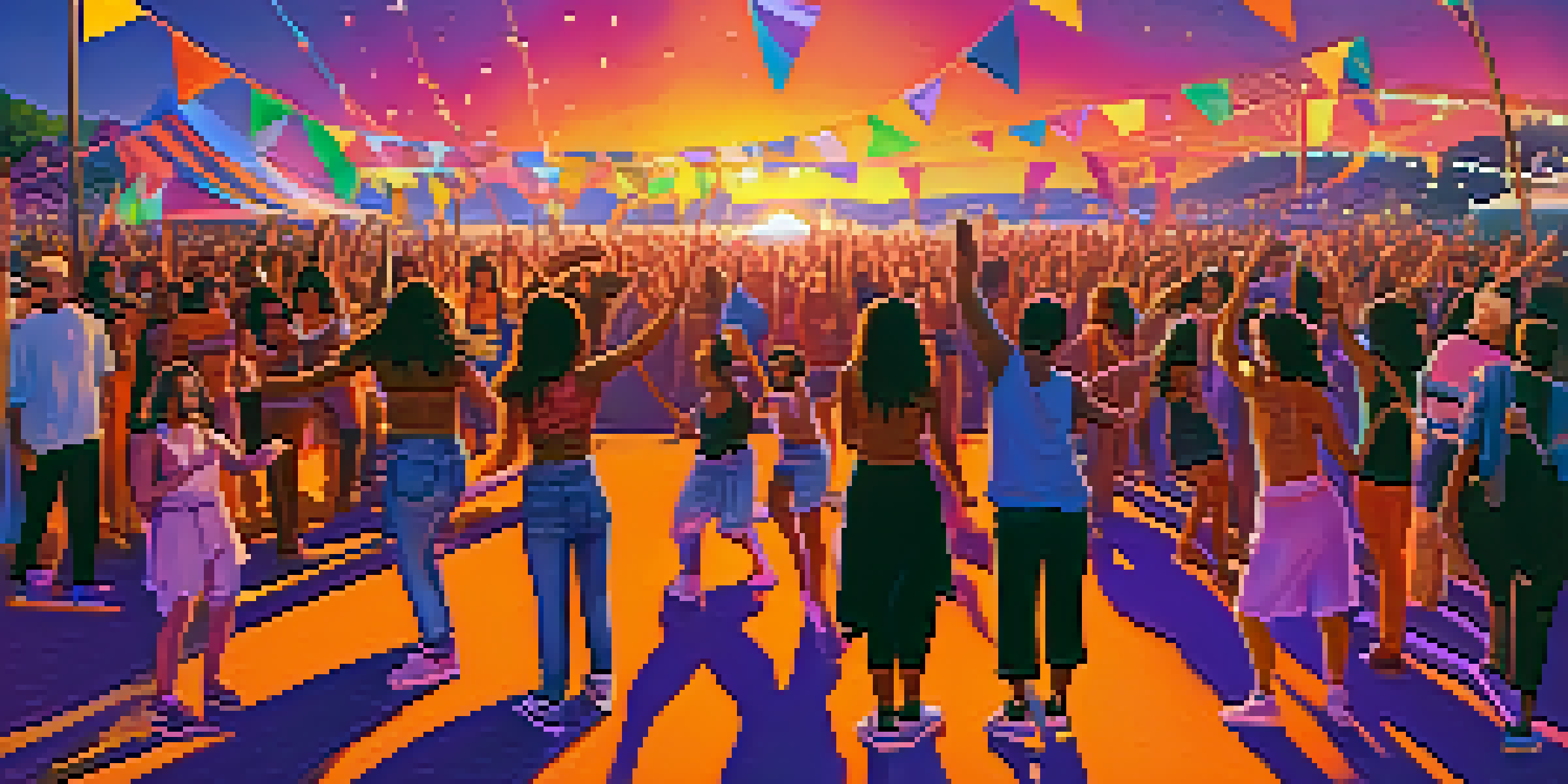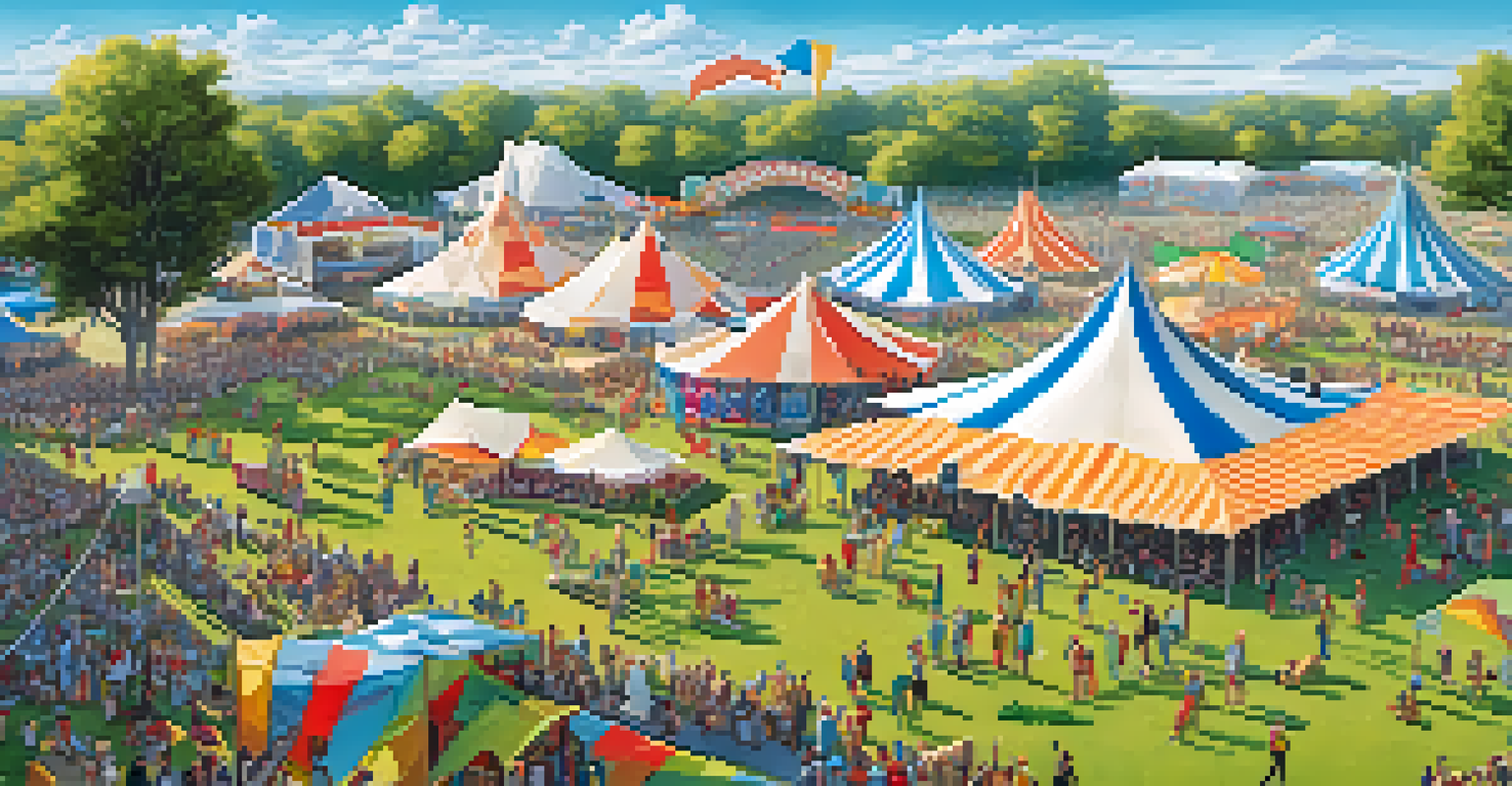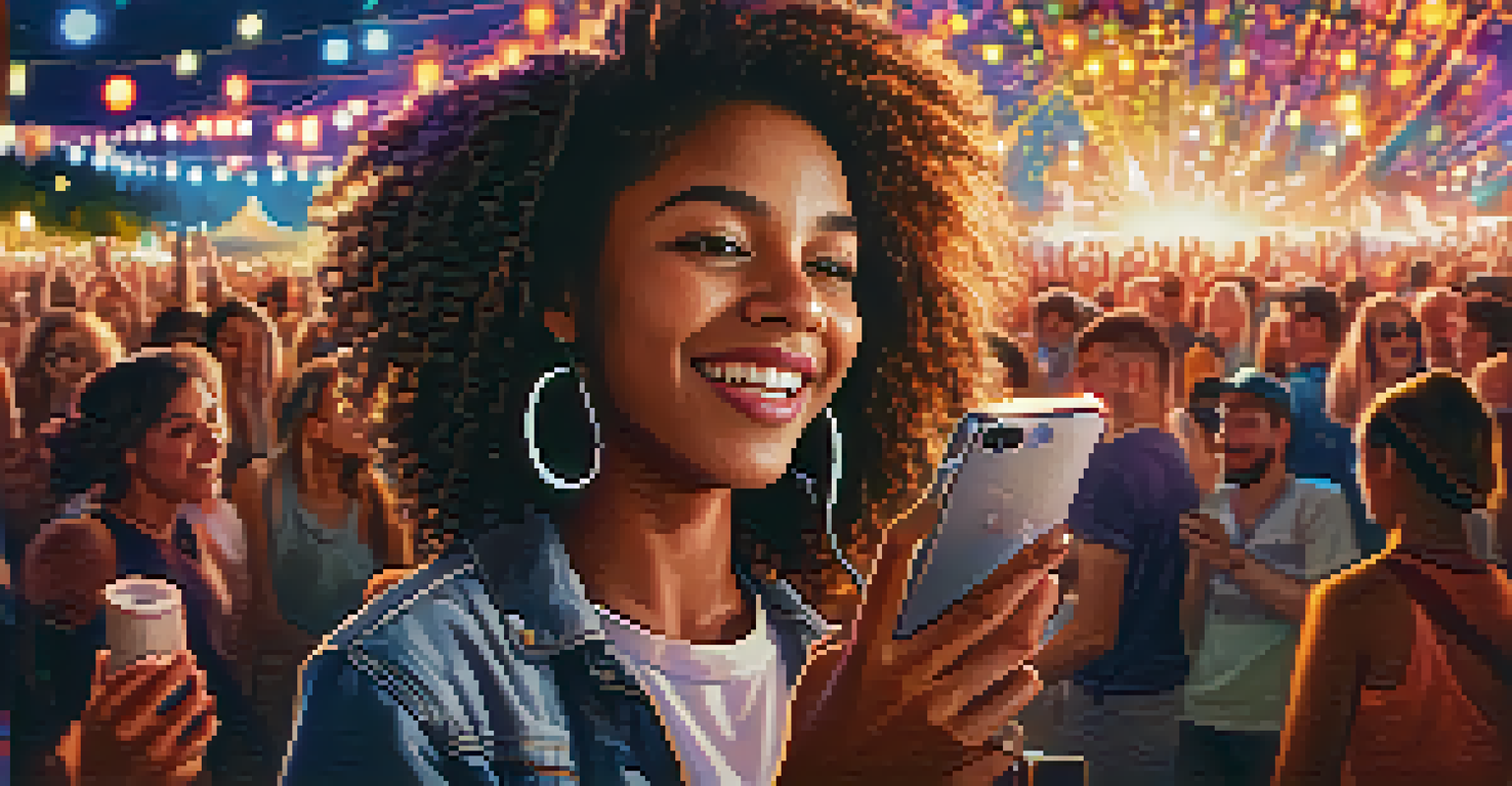The Connection Between Music Festivals and Youth Culture

Music Festivals as Cultural Milestones for Youth
Music festivals have become significant cultural touchpoints for young people. They serve as a gathering place where shared experiences create lasting memories. These events often symbolize freedom, creativity, and self-expression, which are core values in youth culture.
Music is the shorthand of emotion.
Furthermore, festivals often showcase diverse genres and artists that resonate with the youth's evolving tastes. They provide an opportunity for fans to connect with their favorite musicians in an immersive environment. This connection can foster a sense of belonging among attendees.
Ultimately, music festivals are not just about the music; they reflect broader cultural shifts and movements within youth communities. They encapsulate the spirit of the times, allowing young people to explore their identities and social values in a vibrant setting.
The Role of Social Media in Festival Culture
Social media has transformed how music festivals are experienced and shared among youth. Platforms like Instagram and TikTok allow festival-goers to document and broadcast their experiences in real-time. This instant sharing creates a sense of community, even for those who are not physically present.

Moreover, social media amplifies the reach of festivals, introducing them to a global audience. Young people can discover new music and artists through viral content, which profoundly influences their musical preferences. The online buzz surrounding festivals can even lead to increased ticket sales and media coverage.
Festivals Foster Youth Community
Music festivals create a sense of belonging and shared experiences among young people, enhancing their connection to culture and identity.
However, this phenomenon also raises questions about authenticity. With the pressure to curate the perfect festival experience, some argue that social media can detract from the genuine enjoyment of music and connection. Balancing the online and offline experiences is crucial for maintaining the essence of festival culture.
The Economic Impact of Youth Festivals
Music festivals contribute significantly to local economies, particularly in areas popular with young audiences. These events attract thousands of attendees, leading to increased business for hotels, restaurants, and local shops. For many communities, festivals are a vital source of revenue and job creation.
The power of music makes all the difference in the world. It can elevate our spirits, connect us, and inspire change.
In addition, festivals often provide opportunities for young entrepreneurs and artists. Local vendors can showcase their products, while emerging musicians gain exposure to new audiences. This symbiotic relationship enhances the overall festival experience and supports the local creative economy.
Youth engagement in these economic activities also fosters a sense of ownership and pride. When young people see the tangible benefits of their participation, it motivates them to be active members of their communities, reinforcing the connection between music, culture, and local development.
Diversity and Inclusivity at Music Festivals
Diversity and inclusivity have become central themes in contemporary music festivals, reflecting the values of today's youth. Many festivals actively promote a lineup that includes artists from various backgrounds, genres, and cultures. This commitment to representation resonates with young audiences who seek authentic connections.
Moreover, festivals are increasingly focusing on creating welcoming environments for all attendees. Initiatives such as gender-neutral bathrooms, accessible venues, and anti-harassment policies are now common. These efforts ensure that everyone feels safe and included, enhancing the overall festival atmosphere.
Social Media Shapes Festival Culture
Platforms like Instagram and TikTok revolutionize how youth experience and share music festivals, often blending genuine enjoyment with curated online personas.
As young people champion social justice and equality, their expectations for music festivals continue to evolve. They want to support events that align with their values, making it crucial for organizers to prioritize diversity and inclusivity. This shift not only enriches the festival experience but also reflects the broader cultural landscape.
The Impact of Music Festivals on Mental Health
Attending music festivals can have a positive impact on mental health, particularly for young people. The sense of community and shared joy at these events often fosters feelings of belonging and happiness. For many, music festivals serve as a much-needed escape from the pressures of daily life.
In addition, live music has been shown to have therapeutic effects, enhancing mood and reducing stress. The excitement of being surrounded by fellow fans can create a euphoric atmosphere that uplifts spirits. This emotional release is particularly valuable for youth navigating the complexities of mental health.
However, it's essential to acknowledge the potential downsides as well. The overwhelming nature of large crowds, combined with substance use, can lead to anxiety or distress for some individuals. Awareness and support systems at festivals can help mitigate these risks and ensure a positive experience for all attendees.
The Evolution of Music Genres at Festivals
The music genres featured at festivals have evolved significantly, mirroring the changing tastes of youth culture. Today's festivals often blend multiple genres, creating diverse lineups that appeal to a wide range of attendees. This evolution reflects the growing acceptance of genre-crossing artists and musical experimentation.
As a result, festivals can introduce young audiences to new sounds and styles they may not have encountered otherwise. This exposure encourages exploration and appreciation of different musical forms, fostering a more inclusive music culture. It’s not uncommon for attendees to discover their new favorite artist at a festival.
Diversity Drives Festival Engagement
Today's music festivals prioritize diversity and inclusivity, reflecting the evolving values of young attendees and fostering a welcoming atmosphere.
This genre-blending also speaks to the desire for connection among young people. By embracing a variety of musical influences, festivals create a shared experience that transcends individual preferences. This sense of unity is a hallmark of youth culture, emphasizing the importance of collective enjoyment in music.
The Future of Music Festivals and Youth Engagement
As the landscape of music festivals continues to evolve, so too does the engagement of young people. The rise of virtual festivals during the pandemic highlighted the potential for new formats and accessibility. This shift suggests that the future of festivals may incorporate hybrid models, blending in-person and online experiences.
Moreover, young people are increasingly becoming active participants in shaping festival culture. They are vocal about their preferences, advocating for sustainability, inclusivity, and diverse lineups. This engagement empowers youth to influence the direction of festivals, ensuring they remain relevant and reflective of their values.

Looking ahead, it's clear that music festivals will continue to be a vital part of youth culture. By adapting to the changing landscape and listening to the voices of young attendees, festivals can thrive as spaces for connection, expression, and celebration of music.